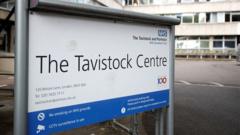49 minutes ago
About sharing
Children will no longer routinely be prescribed puberty blockers at gender identity clinics, NHS England has confirmed.
The decision comes after a review found there was “not enough evidence” they are safe or effective.
Puberty blockers, which pause the physical changes of puberty, will now only be available as part of research.
It comes weeks before an independent review into gender identity services in England is due to be published.
An interim report from the review, published in 2022 by Dr Hilary Cass, had earlier found there were “gaps in evidence” around the drugs and called for a transformation in the model of care for children with gender-related distress.
Dr Cass’s review follows a sharp rise in referrals to the Gender Identity Development Service (Gids), run by the Tavistock and Portman NHS Foundation Trust, which saw an increase from 250 per year to over 5,000 in 2022.
Puberty supressing hormones – more commonly known as puberty blockers – work by suppressing the release of hormones that cause puberty and are often prescribed to children questioning their gender as a way of stopping physical changes such as breast development or facial hair.
Fewer than 100 young people in England are currently prescribed puberty blockers by the NHS. They will all able to continue their treatment.
NHS England held a public consultation on their usage and last year introduced an interim policy which stated they should only be given as part of research trials or in “exceptional circumstances”.
The BBC understands that the new policy, confirmed on Tuesday, will not allow them to be prescribed “routinely” outside of a research trial, but that individual clinicians can still apply to have the drugs funded for patients on a case-by-case basis.
Gids is due to close at the end of March. Two new NHS services due in London and Liverpool are set to open at the beginning of April, followed by a number of regional specialist centres over the next two years.
Health Minister Maria Caulfield said: “We have always been clear that children’s safety and wellbeing is paramount, so we welcome this landmark decision by the NHS.
“Ending the routine prescription of puberty blockers will help ensure that care is based on evidence, expert clinical opinion and is in the best interests of the child.”
The consultation on the future of gender services received more than 4,000 responses, including 10% from trans adults and 5% from clinicians.
John Stewart, national director of specialised commissioning at NHS England, said: “Given that the debate is often very polarised, so too were the responses to the consultation.
“Many people said the policy didn’t go far enough in terms of still allowing potential access [to puberty blockers] through research, and others saying clearly they disagreed fundamentally and that these should be routinely available to everyone who believes they need it.”
The BBC understands NHS England aims to begin its study into the use of puberty blockers by December 2024, and is yet to decide who can take part.
Related Topics
9 June 2023
